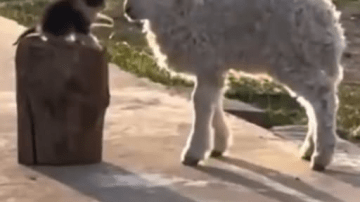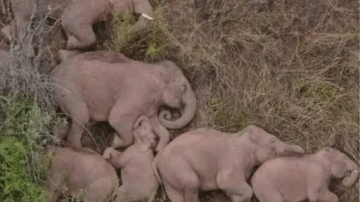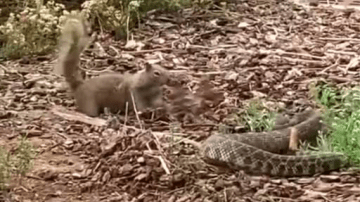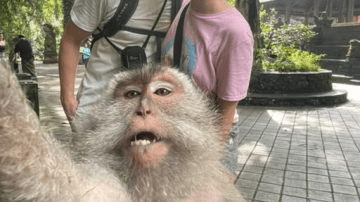As the first light of dawn brushed across the vast African savannah, the golden plains fell into an uncanny silence. The air, usually alive with the distant calls of birds and the soft rustle of grass, held its breath. Beneath an ancient acacia tree, something extraordinary was happening — something that even seasoned rangers might never witness in their entire lives.

A mother elephant was giving birth.
The herd had gathered nearby, sensing the gravity of the moment. Elephants are known for their deep emotional intelligence, and when one of their own labors, the entire family becomes her guardian. They stood still — giants of muscle and memory — their presence forming a quiet wall of strength.
Minutes passed like hours. Then, from beneath the mother’s great frame, a small, slick form slipped gently into the dust. A baby elephant, fragile yet magnificent in its first breath, let out a tiny, trembling cry. The herd stirred, the sound low and soothing — a symphony of trumpeting encouragements and rumbles of approval.
But then something happened that took even the most experienced ranger by surprise. The mother’s body tensed again. Another contraction. Another push.
A second calf emerged.
Gasps rippled through the observers. Elephant twins — one of the rarest sights in nature. In some regions, it happens only once in several decades. For many rangers, it’s a miracle seen only once, if at all, in their lifetime.
The newborns trembled by their mother’s side, still wet, blinking against the light. Their mother — a matriarch known to the local guides as Amahle — leaned down and gently brushed them with her trunk. Her movements were tender, deliberate, sacred. She touched their faces, their tiny ears, their fragile legs — a ritual of recognition. With each stroke, she claimed them as her own.
Then something even more remarkable happened.
The herd began to move.
One by one, the elephants stepped closer, forming a wide circle around the new family. Massive bodies stood shoulder to shoulder, tusks gleaming in the morning light, creating what looked like a living fortress. From above, it might have appeared ceremonial — a ring of ancient guardians standing in silent reverence.
It was as if they knew they were witnessing a miracle.
Inside that protective circle, the world slowed. The twins wobbled on unsteady legs, tiny trunks reaching out, learning the first language of touch. Their mother, though exhausted, gently nudged them, urging them to stand. Her low rumble vibrated through the air, a mother’s voice both commanding and comforting.
Finally, the calves rose. Their legs quivered like saplings in the wind. For a brief moment, one stumbled, the other leaned into its mother, and together, they steadied.
The herd erupted in a chorus of trumpets that echoed across the plains.
It wasn’t just birth. It was a celebration.
The sun climbed higher, casting warm light over the sacred circle. Dust rose in soft clouds as the elephants shifted, touching trunks, swaying gently. The twins pressed close to their mother’s side, drinking for the first time, their small tails flicking in rhythm. Around them, aunties — known as allomothers — watched attentively, ready to assist at any sign of danger or fatigue.
For elephants, motherhood is never a solitary journey. Every birth is shared, every challenge faced together. The herd’s survival depends not only on their immense strength but on their unwavering unity. And now, with two new lives to protect, that unity deepened.
In the following days, the plains buzzed with quiet wonder. The rangers observed from a respectful distance, documenting every precious moment. The twins grew stronger with each sunrise — learning to walk, to follow, to mimic the flapping ears and soft rumbles of their elders.
When one calf wandered too far, an older female — perhaps an aunt or cousin — guided it back with her trunk. When their mother needed rest, others stepped in to guard and comfort the little ones. It was a perfect dance of cooperation, a reminder that in the animal kingdom, love often takes the form of shared responsibility.
One ranger, with years of experience behind him, described it best:
“Watching them was like seeing the heart of nature itself — patient, protective, and profoundly wise.”
He wasn’t wrong.
Every evening, as the sun melted into the horizon, the herd would gather around the twins once more. The air filled with the soft sound of breathing, the steady rhythm of life. The babies would curl against their mother, their small bodies glowing in the amber light. Sometimes they played, tumbling clumsily over each other; other times, they simply rested, surrounded by the living wall of their family.
Each night, the plains whispered a story — not of survival alone, but of connection.
The birth of twins in the wild is a gamble. It demands more from the mother, more from the herd, more from nature itself. Yet in that challenge lies beauty — a test of endurance and empathy that elephants, perhaps better than any other creature, understand.
They teach us something profound: strength is not the absence of struggle. It’s the choice to stand together through it.
Weeks later, the twins could be seen walking confidently beside their mother, their steps synchronized like tiny shadows. Their trunks swung playfully, their ears flapping as they learned to navigate the world. The herd moved with them — slow, deliberate, and proud.
When the wind carried their trumpets across the grasslands, it sounded like joy made audible — a music only nature could compose.
For those who witnessed it, the memory remains unforgettable.
Two rare lives. One herd’s unwavering embrace.
The image of the mother standing tall beneath the fading sun, her twins leaning close to her sides, became a symbol of something greater — the enduring power of unity and the quiet miracle of life itself.
In a world that often feels fractured and uncertain, this simple moment from the heart of the savannah offered a message worth remembering:
Even in the wild, love is not just instinct. It is intention. It is protection. It is shared.
And as the herd faded into the distance, leaving nothing behind but a trail of footprints and the echoes of their song, the plains seemed to sigh with contentment.
Nature, once again, had written a story too beautiful for words — a story of hope, of connection, and of the unbreakable bond between mother and child.
Two tiny elephants, one mighty family — and a reminder that miracles still walk among us.





